Wilhelm II, German Emperor - Picture
More about World War 1
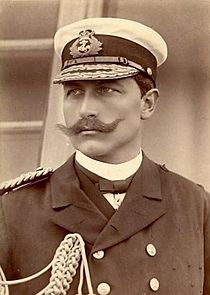
|
|
Wilhelm II, German Emperor
Wilhelm II

Picture - Emperor Wilhelm II, circa 1890
: German Emperor; King of Prussia
Reign: 15 June 1888 - 18 November 1918
Predecessor: Frederick III
Successor: Monarchy abolished
Friedrich Ebert (as chancellor and de facto head of state of the Weimar Republic)
:
Spouse: Augusta Viktoria of Schleswig-Holstein
Hermine Reuss of Greiz
Issue:
: Wilhelm
Eitel Friedrich
Adalbert
August Wilhelm
Oskar
Joachim
Viktoria Luise
Full name:
: German: Friedrich Wilhelm Viktor Albrecht
English: Frederick William Victor Albert
House: House of Hohenzollern
Father: Frederick III
Mother: Victoria
Born: 27 January 1859(1859-01-27)
Berlin, Prussia
Died: 3 June 1941(1941-06-03) (aged 82)
Doorn, Netherlands
Signature:
Religion: Evangelical Christian Church
Wilhelm II (German: Friedrich Wilhelm Viktor Albrecht von Preuxen; English: Frederick William Victor Albert of Prussia) (27 January 1859 - 4 June 1941) was the last German Emperor and King of Prussia, ruling the German Empire and the Kingdom of Prussia from 15 June 1888 to 9 November 1918. He was a grandson of the British Queen Victoria, and related to many kings and princes around Europe. Crowned in 1888 he dismissed the Chancellor, Prince Otto von Bismarck, in 1890 and launched Germany on a bellicose "New Course" in foreign affairs, culminating in his support for Austria in the crisis of the summer of 1914 that caused World War I. Bombastic and impetuous, he blundered often, making major diplomatic decisions on his own, and allowing his generals to dictate policy during World War I, ignoring the civilian government. An ineffective war leader, he lost the support of the army, abdicated in November 1918, and fled to exile in the Netherlands.
Biography
Wilhelm was born on 27 January 1859 in Berlin to Prince Frederick William of Prussia (the future Frederick III) and his wife, Victoria, Princess Royal of Great Britain. He was the first grandchild of Queen Victoria, but more importantly, as the first son of the Crown Prince of Prussia, Wilhelm was (from 1861) the second in the line of succession to Prussia, and also, after 1871, to the German Empire, which, according to the constitution of the German Empire, was ruled by the Prussian King. He was related to many royal figures across Europe, and as war loomed in 1914, Wilhelm was on a first-name basis with his cousins the Tsar Nicholas II of Russia and the King George V of England. He often tried to bully his royal relatives.
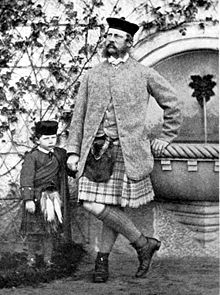
Picture - Wilhelm with his father in 1862
A traumatic breech birth left him with a withered left arm due to Erb's palsy, which he tried with some success to conceal. In many photos he carries a pair of white gloves in his left hand to make the arm seem longer, holds his left hand with his right, or has his crippled arm on the hilt of a sword or holding a cane to give the effect of a useful limb posed at a dignified angle. Biographers including Miranda Carter have suggested that this disability affected his emotional development.
Early years
Wilhelm, beginning at age 6, was tutored by the 39-year old teacher Georg Hinzpeter. He stated later that his instructor never uttered a word of praise for his efforts. As a teenager he was educated at Kassel at the Friedrichsgymnasium and the University of Bonn, where he became a member of Corps Borussia Bonn. Wilhelm possessed a quick intelligence, but unfortunately this was often overshadowed by a cantankerous temper. Wilhelm took an interest in the science and technology of the age, but although he liked to pose in conversation as a man of the world, he remained convinced that he belonged to a distinct order of mankind, designated for monarchy by the grace of God. Wilhelm was accused of megalomania as early as 1892, by the Portuguese man of letters Ex§a de Queiroz, then again in 1894 by the German pacifist Ludwig Quidde.
As a scion of the Royal house of Hohenzollern, Wilhelm was also exposed from an early age to the military society of the Prussian aristocracy. This had a major impact on him and, in maturity, Wilhelm was seldom to be seen out of uniform. The hyper-masculine military culture of Prussia in this period did much to frame Wilhelm's political ideals as well as his personal relationships.
Crown Prince Frederick was viewed by his son with a deeply felt love and respect. His father's status as a hero of the wars of unification was largely responsible for the young Wilhelm's attitude, as in the circumstances in which he was raised; close emotional contact between father and son was not encouraged. Later, as he came into contact with the Crown Prince's political opponents, Wilhelm came to adopt more ambivalent feelings toward his father, given the perceived influence of Wilhelm's mother over a figure who should have been possessed of masculine independence and strength. Wilhelm also idolised his grandfather, Wilhelm I, and he was instrumental in later attempts to foster a cult of the first German Emperor as "Wilhelm the Great".
In many ways, Wilhelm was a victim of his inheritance and of Otto von Bismarck's machinations. Both sides of his family had suffered from mental illness, and this may explain his emotional instability. The Emperor's parents, Frederick and Victoria, were great admirers of the Prince Consort of the United Kingdom, Victoria's father. They planned to rule as consorts, like Albert and Queen Victoria, and they planned to reform the fatal flaws in the executive branch that Bismarck had created for himself. The office of Chancellor responsible to the Emperor would be replaced with a British-style cabinet, with ministers responsible to the Reichstag. Government policy would be based on the consensus of the cabinet. Frederick described the Imperial Constitution as "ingeniously contrived chaos."
The Crown Prince and Princess shared the outlook of the Progressive Party, and Bismarck was haunted by the fear that should the old Emperor die-and he was now in his seventies-they would call on one of the Progressive leaders to become Chancellor. He sought to guard against such a turn by keeping the Crown Prince from a position of any influence and by using foul means as well as fair to make him unpopular.
The Crown Prince and Princess shared the outlook of the Progressive Party, and Bismarck was haunted by the fear that should the old Emperor die-and he was now in his seventies-they would call on one of the Progressive leaders to become Chancellor. He sought to guard against such a turn by keeping the Crown Prince from a position of any influence and by using foul means as well as fair to make him unpopular.
When Wilhelm was in his early twenties, Bismarck tried to separate him from his liberal parents with some success. Bismarck planned to use the young prince as a weapon against his parents in order to retain his own political dominance. Wilhelm thus developed a dysfunctional relationship with his parents, but especially with his English mother. In an outburst in April 1889, which the Empress Victoria conveyed in a letter to her mother, Queen Victoria, Wilhelm angrily implied that âan English doctor killed my father, and an English doctor crippled my arm - which is the fault of my motherâ who allowed no German physicians to attend to herself or her immediate family.
Next to the throne
The German Emperor Wilhelm I died in Berlin on 9 March 1888, and Prince Wilhelm's father was proclaimed Emperor as Frederick III. He was already suffering from an incurable throat cancer and spent all 99 days of his reign fighting the disease before dying. On 15 June of that same year, his 29-year-old son succeeded him as German Emperor and King of Prussia.
Although in his youth he had been a great admirer of Otto von Bismarck, Wilhelm's characteristic impatience soon brought him into conflict with the "Iron Chancellor", the dominant figure in the foundation of his empire. The new Emperor opposed Bismarck's careful foreign policy, preferring vigorous and rapid expansion to protect Germany's "place in the sun." Furthermore, the young Emperor had come to the throne with the determination that he was going to rule as well as reign, unlike his grandfather, who had largely been content to leave day-to-day administration to Bismarck.
Early conflicts between Wilhelm II and his chancellor soon poisoned the relationship between the two men. Bismarck believed that Wilhelm was a lightweight who could be dominated, and he showed scant respect for Wilhelm's policies in the late 1880s. The final split between monarch and statesman occurred soon after an attempt by Bismarck to implement a far-reaching anti-Socialist law in early 1890.
Break with Bismarck
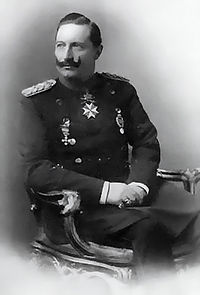
Picture - In this photo of Wilhelm, his right hand is holding his left hand which had Erb's palsy.
It was during this time that Bismarck, after gaining an absolute majority in favor of his policies in the Reichstag, decided to make the anti-Socialist laws permanent. His Kartell, the majority of the amalgamated Conservative Party and the National Liberal Party, favored making the laws permanent, with one exception: the police power to expel Socialist agitators from their homes. This power had been used excessively at times against political opponents, and the National Liberal Party was unwilling to pass the expulsion clause in the first place. Bismarck would not give his assent to a modified bill, so the Kartell split over this issue. The Conservatives would support the bill only in its entirety, and threatened to, and eventually did, veto the entire bill.
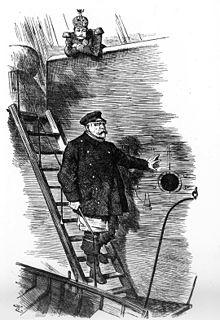
Picture - "Dropping the Pilot"
As the debate continued, Wilhelm became increasingly interested in social problems, especially the treatment of mine workers who went on strike in 1889. Following his policy of active participation in government, he routinely interrupted Bismarck in Council to make clear where he stood on social policy. Bismarck sharply disagreed with Wilhelm's policy and worked to circumvent it. Even though Wilhelm supported the altered anti-Socialist bill, Bismarck pushed for his support to veto the bill in its entirety, but when Bismarck's arguments couldn't convince Wilhelm, he became excited and agitated until uncharacteristically he blurted out his motive for having the bill fail: he wanted the Socialists to agitate until a violent clash occurred that could be used as a pretext to crush them. Wilhelm replied that he wasn't willing to open his reign with a bloody campaign against his subjects.
The next day, after realising his blunder, Bismarck attempted to reach a compromise with Wilhelm by agreeing to his social policy towards industrial workers, and even suggested a European council to discuss working conditions, presided over by the German Emperor.
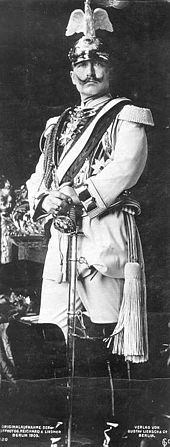
Picture - Wilhelm II, German Emperor
Despite this, a turn of events eventually led to his distance from Wilhelm. Bismarck, feeling pressured and unappreciated by the Emperor and undermined by ambitious advisors, refused to sign a proclamation regarding the protection of workers along with Wilhelm, as was required by the German Constitution, to protest Wilhelm's ever-increasing interference with Bismarck's previously unquestioned authority. Bismarck also worked behind the scenes to break the Continental Labour Council Wilhelm held so dear. The final break came as Bismarck searched for a new parliamentary majority, with his Kartell voted from power due to the anti-Socialist bill fiasco. The remaining powers in the Reichstag were the Catholic Centre Party and the Conservative Party. Bismarck wished to form a new bloc with the Centre Party, and invited Ludwig Windthorst, the party's parliamentary leader, to discuss an alliance. This would be Bismarck's last political maneuver. Wilhelm was furious to hear about Windthorst's visit. In a parliamentary state, the head of government depends on the confidence of the parliamentary majority, and certainly has the right to form coalitions to ensure his policies a majority, but in Germany, the Chancellor depended on the confidence of the Emperor alone, and Wilhelm believed that the Emperor had the right to be informed before his minister's meeting. After a heated argument in Bismarck's estate over Imperial authority, Wilhelm stormed out, both parting ways permanently. Bismarck, forced for the first time into a situation he could not use to his advantage, wrote a blistering letter of resignation, decrying Wilhelm's interference in foreign and domestic policy, which was only published after Bismarck's death. When Bismarck realised that his dismissal was imminent:
All Bismarckâs resources were deployed; he even asked Empress Frederick to use her influence at her son on his behalf. But the wizard had lost his magic; his spells were powerless because they were exerted on people who did not respect them, and he who had so signally disregarded Kantâs command to use people as ends in themselves had too small a stock of loyalty to draw on. As Lord Salisbury told Queen Victoria: 'The very qualities which Bismarck fostered in the Emperor in order to strengthen himself when the Emperor Frederick should come to the throne have been the qualities by which he has been overthrown.' The Empress, with what must have been a mixture of pity and triumph, told him that her influence with her son could not save him for he himself had destroyed it.
All Bismarckâs resources were deployed; he even asked Empress Frederick to use her influence at her son on his behalf. But the wizard had lost his magic; his spells were powerless because they were exerted on people who did not respect them, and he who had so signally disregarded Kantâs command to use people as ends in themselves had too small a stock of loyalty to draw on. As Lord Salisbury told Queen Victoria: 'The very qualities which Bismarck fostered in the Emperor in order to strengthen himself when the Emperor Frederick should come to the throne have been the qualities by which he has been overthrown.' The Empress, with what must have been a mixture of pity and triumph, told him that her influence with her son could not save him for he himself had destroyed it.
Although Bismarck had sponsored landmark social security legislation, by 1889-90 he had become disillusioned with the attitude of workers. In particular, he was opposed to wage increases, improving working conditions, and regulating labour relations. Moreover the Kartell, the shifting political coalition that Bismarck had been able to forge since 1867, had lost a working majority in the Reichstag. Bismarck also attempted to sabotage the Labour Conference that the Kaiser was organising. In March 1890, the dismissal of Bismarck coincided with the Kaiser's opening of the Labour Conference in Berlin. Subsequently at the opening of the Reichstag on 6 May 1890, the Kaiser stated that the most pressing issue was the further enlargement of the bill concerning the protection of the labourer. In 1891, the Reichstag passed the Workers Protection Acts, which improved working conditions, protected women and children and regulated labour relations.
It has been alleged that Bismarck was organising a military coup that would disband the striking miners, dissolve the Reichstag, repeal the universal suffrage law, introduce limited suffrage, reduce the Kaiser to a puppet, and establish a military dictatorship. The book that accompanied the BBC series Fall of Eagles - which covered the period 1848-1918 and traced the downfall of the Romanov, Habsburg and Hohenzollern dynasties - contains an interview in which Louis Ferdinand, a grandson of the Kaiser, says:
Had Bismarck stayed he would not have helped. He already wanted to abolish all the reforms that had been introduced. He was aspiring to establish a kind of shogunate and hoped to treat our family in the same way the Japanese shoguns treated the Japanese emperors isolated in Kyoto. My grandfather had no other choice but to dismiss him.
Had Bismarck stayed he would not have helped. He already wanted to abolish all the reforms that had been introduced. He was aspiring to establish a kind of shogunate and hoped to treat our family in the same way the Japanese shoguns treated the Japanese emperors isolated in Kyoto. My grandfather had no other choice but to dismiss him.
Bismarck resigned at Wilhelm II's insistence in 1890, at age 75, to be succeeded as Chancellor of Germany and Minister-President of Prussia by Leo von Caprivi, who in turn was replaced by Chlodwig zu Hohenlohe-Schillingsfx¼rst in 1894.
In appointing Caprivi and then Hohenlohe, Wilhelm was embarking upon what is known to history as "the New Course", in which he hoped to exert decisive influence in the government of the empire. There is debate amongst historians as to the precise degree to which Wilhelm succeeded in implementing "personal rule" in this era, but what is clear is the very different dynamic which existed between the Crown and its chief political servant (the Chancellor) in the "Wilhelmine Era". These chancellors were senior civil servants and not seasoned politician-statesmen like Bismarck. Wilhelm wanted to preclude the emergence of another Iron Chancellor, whom he ultimately detested as being "a boorish old killjoy" who had not permitted any minister to see the Emperor except in his presence, keeping a stranglehold on effective political power. Upon his enforced retirement and until his dying day, Bismarck was to become a bitter critic of Wilhelm's policies, but without the support of the supreme arbiter of all political appointments (the Emperor) there was little chance of Bismarck exerting a decisive influence on policy.
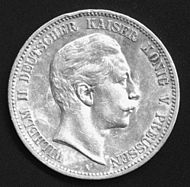
Picture - Silver 5 mark coin of Wilhelm II.
Something which Bismarck was able to effect was the creation of the "Bismarck myth". This was a view-which some would argue was confirmed by subsequent events-that, with the dismissal of the Iron Chancellor, Wilhelm II effectively destroyed any chance Germany had of stable and effective government. In this view, Wilhelm's "New Course" was characterised far more as the German ship of state going out of control, eventually leading through a series of crises to the carnage of the First and Second World Wars.
The strong chancellors
Following the dismissal of Hohenlohe in 1900, Wilhelm appointed the man whom he regarded as "his own Bismarck", Bernhard von Bx¼low.
Wilhelm's involvement in the domestic sphere was more limited in the early twentieth century than it had been in the first years of his reign. In part, this was due to the appointment of Bx¼low and Bethmann-arguably both men of greater force of character than Wilhelm's earlier chancellors-but also because of his increasing interest in foreign affairs.
Personality
Historians have frequently stressed the role of Wilhelm's personality in shaping his reign. Thus, Thomas Nipperdey concludes he was:
"gifted, with a quick understanding, sometimes brilliant, with a taste for the modern,-technology, industry, science-but at the same time superficial, hasty, restless, unable to relax, without any deeper level of seriousness, without any desire for hard work or drive to see things through to the end, without any sense of sobriety, for balance and boundaries, or even for reality and real problems, uncontrollable and scarcely capable of learning from experience, desperate for applause and success,-as Bismarck said early on in his life, he wanted every day to be his birthday-romantic, sentimental and theatrical, unsure and arrogant, with an immeasurably exaggerated self-confidence and desire to show off, a juvenile cadet, who never took the tone of the officersâ mess out of his voice, and brashly wanted to play the part of the supreme warlord, full of panicky fear of a monotonous life without any diversions, and yet aimless, pathological in his hatred against his English mother.".
Langer et al. (1968) emphasize the negative international consequences of his erratic personality:
He believed in force, and the 'survival of the fittest' in domestic as well as foreign politics....William was not lacking in intelligence, but he did lack stability, disguising his deep insecurities by swagger and tough talk. He frequently fell into depressions and hysterics....William's personal instability was reflected in vacillations of policy. His actions, at home as well as abroad, lacked guidance, and therefore often bewildered or infuriated public opinion. He was not so much concerned with gaining specific objectives, as had been the case with Bismarck, as with asserting his will. This trait in the ruler of the leading Continental power was one of the main causes of the uneasiness prevailing in Europe at the turn-of-the-century.
Foreign affairs
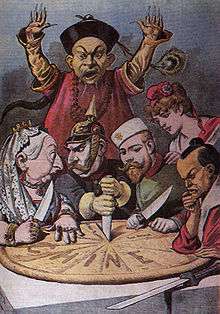
Picture - China imperialism cartoon-while a Mandarin official helplessly looks on, China as a pie is about to be carved up by Queen Victoria (British Empire), Wilhelm II (German Empire), Nicolas II (Russian Empire), Marianne (France), and a samurai (Japanese Empire)
German foreign policy under Wilhelm II was faced with a number of significant problems. Perhaps the most apparent was that Wilhelm was an impatient man, subjective in his reactions and affected strongly by sentiment and impulse. He was personally ill-equipped to steer German foreign policy along a rational course. It is now widely recognised that the various spectacular acts which Wilhelm undertook in the international sphere were often partially encouraged by the German foreign policy elite. There were a number of key exceptions, such as the famous Kruger telegram of 1896 in which Wilhelm congratulated President Paul Kruger of the Transvaal Republic on the suppression of the Jameson Raid, thus alienating British public opinion.
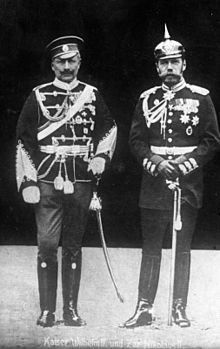
Picture - Wilhelm II with Nicholas II of Russia in 1905, wearing the military uniforms of each other's nations
Wilhelm invented and spread fears of a yellow peril trying to interest other European rulers in the perils they faced by invading Chinese; few other leaders paid attention. German troops were sent to fight in the Boxer Rebellion.
Under Wilhelm Germany attempted to develop its colonies in Africa and the Pacific, but few became self-supporting and all were lost during World War I. In Namibia a native revolt against German rule led to the Herero and Namaqua Genocide, although Wilhelm eventually ordered it be stopped.
One of the few times Wilhelm succeeded in personal "diplomacy" was when he supported Archduke Franz Ferdinand of Austria in marrying Sophie Chotek in 1900 against the wishes of Emperor Franz Joseph.
One "domestic" triumph for Wilhelm was when his daughter Victoria Louise married the Duke of Brunswick in 1913; this helped heal the rift between the House of Hanover and the House of Hohenzollern after the 1866 annexation of Hanover by Prussia.
Moroccan Crisis
One of Wilhelm II's diplomatic blunders sparked the Moroccan Crisis of 1905, when Wilhelm made a spectacular visit to Tangier, in Morocco. Wilhelm's presence was seen as an assertion of German interests in Morocco, in opposition to France. In his speech he even made certain remarks in favour of Moroccan independence. This led to friction with France, which had expanding colonial interests in Morocco, and led to the Algeciras Conference, which served largely to further isolate Germany in Europe.
Daily Telegraph affair
Perhaps Wilhelm's most damaging personal blunder in the arena of foreign policy had a far greater impact in Germany than internationally. The Daily Telegraph Affair of 1908 stemmed from the publication of some of Wilhelm's opinions in edited form in the British daily newspaper of that name. Wilhelm saw it as an opportunity to promote his views and ideas on Anglo-German friendship, but instead, due to his emotional outbursts during the course of the interview, Wilhelm ended up further alienating not only the British people, but also the French, Russians, and Japanese all in one fell swoop by implying, among other things, that the Germans cared nothing for the British; that the French and Russians had attempted to incite Germany to intervene in the Second Boer War; and that the German naval buildup was targeted against the Japanese, not Britain. (One memorable quotation from the interview was, "You English are mad, mad, mad as March hares.") The effect in Germany was quite significant, with serious calls for his abdication being mentioned in the press. Quite understandably, Wilhelm kept a very low profile for many months after the Daily Telegraph fiasco, and later exacted his revenge by enforcing the resignation of Prince Bx¼low, who had abandoned the Emperor to public criticism by publicly accepting some responsibility for not having edited the transcript of the interview before its publication.
The Daily Telegraph crisis deeply wounded Wilhelm's previously unimpaired self-confidence, so much so that he soon suffered a severe bout of depression from which he never really recovered (photographs of Wilhelm in the post-1908 period show a man with far more haggard features and greying hair), and he lost much of the influence he had previously exercised in domestic and foreign policy.
Promoter of arts and science
Wilhelm II was an enthusiastic promoter of the arts and sciences, as well as public education and social welfare. He sponsored the Kaiser Wilhelm Society, for the promotion of scientific research; it was funded by wealthy private donors and the state and comprised a number of research institutes in both pure and applied sciences. The Prussian Academy of Sciences, however, was unable to avoid the Kaiser's pressure and lost some of its autonomy when it was forced to incorporate new programs in engineering, and award new fellowships in engineering sciences as a gift from the Kaiser in 1900.
Wilhelm II supported the modernisers as they tried to reform the Prussian system of secondary education, which was rigidly traditional, elitist, politically authoritarian, and unchanged by the progress in the natural sciences.
Naval expansion
Nothing Wilhelm II did in the international arena was of more influence than his decision to pursue a policy of massive naval construction. A powerful navy was Wilhelm's pet project. He had inherited, from his mother, a love of the British Royal Navy, which was at that time the world's largest. He once confided to his uncle, Edward VII, that his dream was to have a "fleet of my own some day". Wilhelm's frustration over his fleet's poor showing at the Fleet Review at his grandmother Queen Victoria's Diamond Jubilee celebrations, combined with his inability to exert German influence in South Africa following the dispatch of the Kruger telegram, led to Wilhelm taking definitive steps toward the construction of a fleet to rival that of his British cousins. Wilhelm was fortunate to be able to call on the services of the dynamic naval officer Alfred von Tirpitz, whom he appointed to the head of the Imperial Naval Office in 1897.
The new admiral had conceived of what came to be known as the "Risk Theory" or the Tirpitz Plan, by which Germany could force Britain to accede to German demands in the international arena through the threat posed by a powerful battlefleet concentrated in the North Sea. Tirpitz enjoyed Wilhelm's full support in his advocacy of successive naval bills of 1897 and 1900, by which the German navy was built up to contend with that of the United Kingdom. Naval expansion under the Fleet Acts eventually led to severe financial strains in Germany by 1914, as by 1906 Wilhelm had committed his navy to construction of the much larger, more expensive dreadnought type of battleship.
In 1889 Wilhelm II reorganised top level control of the navy by creating a Navy Cabinet (Marine-Kabinett) equivalent to the German Imperial Military Cabinet which had previously functioned in the same capacity for both the army and navy. The Head of the navy cabinet was responsible for promotions, appointments, administration and issuing orders to naval forces. Captain Gustav von Senden-Bibran was appointed as its first head and remained so until 1906. The existing Imperial admiralty was abolished and its responsibilities divided between two organisations. A new position (equivalent to the supreme commander of the army) was created, chief of the high command of the admiralty (Oberkommando der Marine), being responsible for ship deployments, strategy and tactics. Vice Admiral Max von der Goltz was appointed in 1889 and remained in post until 1895. Construction and maintenance of ships and obtaining supplies was the responsibility of the State Secretary of the Imperial Navy Office (Reichsmarineamt), responsible to the Chancellor and advising the Reichstag on naval matters. The first appointee was Rear Admiral Eduard Heusner, followed shortly by Rear Admiral Friedrich von Hollmann from 1890 to 1897. Each of these three heads of department reported separately to Wilhelm II.
In addition to the expansion of the fleet the Kiel Canal was opened in 1895 enabling faster movements between the North Sea and the Baltic Sea.
World War I
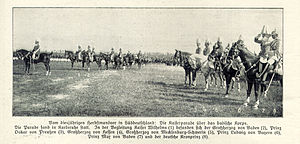
Picture - Emperor Wilhelm with other german top politicians at a pre-war military training in autumn 1909
The Sarajevo crisis
Wilhelm was a friend of Franz Ferdinand, Archduke of Austria-Este, and he was deeply shocked by his assassination on 28 June 1914. Wilhelm offered to support Austria-Hungary in crushing the Black Hand, the secret organisation that had plotted the killing, and even sanctioned the use of force by Austria against the perceived source of the movement-Serbia (this is often called "the blank cheque"). He wanted to remain in Berlin until the crisis was resolved, but his courtiers persuaded him instead to go on his annual cruise of the North Sea on 6 July 1914. Wilhelm made erratic attempts to stay on top of the crisis via telegram, and when the Austro-Hungarian ultimatum was delivered to Serbia, he hurried back to Berlin. He reached Berlin on 28 July, read a copy of the Serbian reply, and wrote on it:
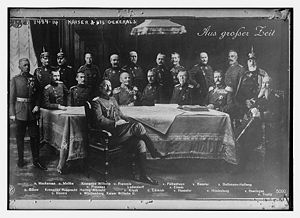
Picture - A composite image of Wilhelm II with German generals
A brilliant solution-and in barely 48 hours! This is more than could have been expected. A great moral victory for Vienna; but with it every pretext for war falls to the ground, and [the Ambassador] Giesl had better have stayed quietly at Belgrade. On this document, I should never have given orders for mobilisation.
A brilliant solution-and in barely 48 hours! This is more than could have been expected. A great moral victory for Vienna; but with it every pretext for war falls to the ground, and [the Ambassador] Giesl had better have stayed quietly at Belgrade. On this document, I should never have given orders for mobilisation.
Unknown to the Emperor, Austro-Hungarian ministers and generals had already convinced the 84-year-old Francis Joseph I of Austria to sign a declaration of war against Serbia. As a direct consequence, Russia began a general mobilization to attack Austria in defense of Serbia.
July 1914
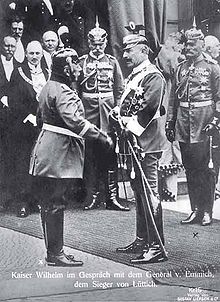
Picture - Emperor Wilhelm in conversation with the victor of Lix¨ge, General Otto von Emmich; in the background the generals Hans von Plessen (middle) and Moriz von Lyncker (right).
After Germany asked France if France would remain neutral in case of a war between Germany and Russia, the French reply, stating "France maintains its full right to act as France pleases.", reached Berlin at the 29 July.
On the night of 30 July, when handed a document stating that Russia would not cancel its mobilisation, Wilhelm wrote a lengthy commentary containing the startling observations:
"For I no longer have any doubt that England, Russia and France have agreed among themselves-knowing that our treaty obligations compel us to support Austria-to use the Austro-Serb conflict as a pretext for waging a war of annihilation against us ... Our dilemma over keeping faith with the old and honourable Emperor has been exploited to create a situation which gives England the excuse she has been seeking to annihilate us with a spurious appearance of justice on the pretext that she is helping France and maintaining the well-known Balance of Power in Europe, i.e. playing off all European States for her own benefit against us."
"For I no longer have any doubt that England, Russia and France have agreed among themselves-knowing that our treaty obligations compel us to support Austria-to use the Austro-Serb conflict as a pretext for waging a war of annihilation against us ... Our dilemma over keeping faith with the old and honourable Emperor has been exploited to create a situation which gives England the excuse she has been seeking to annihilate us with a spurious appearance of justice on the pretext that she is helping France and maintaining the well-known Balance of Power in Europe, i.e. playing off all European States for her own benefit against us."
More recent British authors state that Wilhelm II actually declared "Ruthlessness and weakness will start the most terrifying war of the world, whose purpose is to destroy Germany. Because there can no longer be any doubts, England, France and Russia have conspired them selves together to fight an annihilation war against us"
When it became clear that Germany would experience a war on two fronts, and that the United Kingdom would enter the war if Germany attacked France through neutral Belgium, the panic-stricken Wilhelm attempted to redirect the main attack against Russia. When Helmuth von Moltke (the younger) (who had chosen the old plan from 1905, made by the former german general von Schlieffen for the possibility of Germany war on two fronts) told him that this was impossible, Wilhelm said: "Your uncle would have given me a different answer!" Wilhelm is also reported to have said: "To think that George and Nicky should have played me false! If my grandmother had been alive, she would never have allowed it." In the original Schlieffen plan Germany should attack the (supposed) weaker enemy first, meaning France. The plan supposed that it would take a long time before Russia was ready for war. And defeating France had not been a hard task for Prussia in the Franco-Prussian War of 1870-1871.
At the 1914 border between France and Germany, an attack at this more southern part of France could be stopped by the French fortress along the border. However Wilhelm II got Helmuth Moltke (the younger) to not also invade the Netherlands.
It must also be noted that also France violated the territory of Belgium, who declined French help even after the Germans had started to march into Luxembourg and Belgium.
The Great War
Wilhelm is a controversial issue in historical scholarship and this period of German history. Until the late 1950s he was seen as an important figure in German history during this period. For many years after that, the dominant view was that he had little or no influence on German policy, a view which has been challenged since the late 1970s, particularly by Professor John C. G. Rx¶hl, who saw Wilhelm II as the key figure in understanding the recklessness and downfall of Imperial Germany.
Picture - French Propaganda Postcard from the World War I era showing a caricature of Wilhelm II biting into the world. The text reads "The glutton - too hard."
It is difficult to argue that Wilhelm actively sought to unleash the First World War. Though he had ambitions for the German Empire to be a world power, it was never Wilhelm's intention to conjure a large-scale conflict to achieve such ends. As soon as his better judgment indicated that a world war was imminent, he made strenuous efforts to preserve the peace-such as The Willy-Nicky Correspondence mentioned earlier, and his optimistic interpretation of the Austro-Hungarian ultimatum that Austro-Hungarian troops should go no further than Belgrade, thus limiting the conflict. But by then it was far too late, for the eager military officials of Germany and the German Foreign Office were successful in persuading him to sign the mobilisation order and initiate the Schlieffen Plan that envisioned the occupation of Paris within 40 days. The contemporary British reference to the First World War as "the Kaiser's War" in the same way that the Second was "Hitler's War" is not wholly accurate in its suggestion that Wilhelm was deliberately responsible for unleashing the conflict. "He may not have been 'the father of war' but he was certainly its godfather' (A. Woodcock-Clarke).
His own love of the culture and trappings of militarism and push to endorse the German military establishment and industry (most notably the Krupp corporation), which were the key support which enabled his dynasty to rule helped push his empire into an armaments race with competing European powers. Similarly, though on signing the mobilisation order, Wilhelm is reported as having said, "You will regret this, gentlemen." He had encouraged Austria to pursue a hard line with Serbia, was an enthusiastic supporter of the subsequent German actions during the war, and reveled in the title of "Supreme War Lord" and "Allerhx¶chste" (All-highest).
Germany's war aims were published with his consent on 9 September 1914, and stiffened his enemies' resolve to avoid a compromise peace, whatever the costs.
Shadow-Kaiser
Picture - Hindenburg, Wilhelm II, and Ludendorff in January 1917
Upon hearing that his cousin George V had changed the name of the British royal house to Windsor, Wilhelm remarked that he planned to see Shakespeare's play The Merry Wives of Saxe-Coburg-Gotha.
The role of ultimate arbiter of wartime national affairs proved too heavy a burden for Wilhelm. Even the advice of his closest aides such as Moriz von Lyncker was not adequate. As the war progressed, his influence receded and inevitably his lack of ability in military matters led to an ever-increasing reliance upon his generals, so much that after 1916 the Empire had effectively become a military dictatorship under the control of Paul von Hindenburg and Erich Ludendorff. Increasingly cut off from reality and the political decision-making process, Wilhelm vacillated between defeatism and dreams of victory, depending upon the fortunes of his armies. He remained a useful figurehead, and he toured the lines and munitions plants, awarded medals and gave encouraging speeches. Nevertheless, Wilhelm still retained the ultimate authority in matters of political appointment, and it was only after his consent had been gained that major changes to the high command could be effected. Wilhelm was in favour of the dismissal of Helmuth von Moltke the Younger in September 1914 and his replacement by Erich von Falkenhayn. The Kaiser's support collapsed in October-November 1918 in the army, the civilian government, and German public opinion, as President Wilson made clear the Kaiser could no longer be a party to peace negotiations.
Abdication and flight
Wilhelm was at the Imperial Army headquarters in Spa, Belgium, when the uprisings in Berlin and other centres took him by surprise in late 1918. Mutiny among the ranks of his beloved Kaiserliche Marine, the imperial navy, profoundly shocked him. After the outbreak of the German Revolution, Wilhelm could not make up his mind whether or not to abdicate. Up to that point, he was confident that even if he were obliged to vacate the German throne, he would still retain the Prussian kingship. The unreality of this belief was revealed when, for the sake of preserving some form of government in the face of anarchy, Wilhelm's abdication both as German Emperor and King of Prussia was abruptly announced by the Chancellor, Prince Max of Baden, on 9 November 1918. (Prince Max himself was forced to resign later the same day, when it became clear that only Friedrich Ebert, leader of the SPD could effectively exert control.)
Wilhelm consented to the abdication only after Ludendorff's replacement, General Wilhelm Groener, had informed him that the officers and men of the army would march back in good order under Paul von Hindenburg's command, but would certainly not fight for Wilhelm's throne on the home front. The monarchy's last and strongest support had been broken, and finally even Hindenburg, himself a lifelong royalist, was obliged, with some embarrassment, to advise the Emperor to give up the crown. For telling Wilhelm the truth, Groener would not be forgiven by German arch-conservatives. The abdication instrument was not actually signed until 28 November; by then his six sons had sworn not to succeed him, so ending the dynasty's connection with the crown of Prussia.
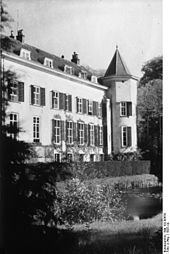
Picture - The Huis Doorn in 1925
The following day, the former Emperor crossed the border by train and went into exile in the Netherlands, which had remained neutral throughout the war. Upon the conclusion of the Treaty of Versailles in early 1919, Article 227 expressly provided for the prosecution of Wilhelm "for a supreme offence against international morality and the sanctity of treaties", but Queen Wilhelmina refused to extradite him, despite appeals from the Allies. President Wilson rejected extradition, arguing that punishing Wilhelm for waging war would destabilize international order and lose the peace.
The erstwhile Emperor first settled in Amerongen, and then subsequently purchased a small castle in the municipality of Doorn on 16 August 1919 and moved in on 15 May 1920. This was to be his home for the remainder of his life. From this residence, Huis Doorn, Wilhelm absolved his officers and servants of their oath of loyalty to him; however, he himself never formally relinquished his titles, and hoped to return to Germany in the future. The Weimar Republic allowed Wilhelm to remove twenty-three railway wagons of furniture, twenty-seven containing packages of all sorts, one bearing a car and another a boat, from the New Palace at Potsdam.
Life in exile
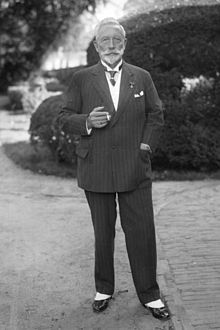
Picture - Wilhelm in 1933
On 2 December 1919, Wilhelm wrote to Field Marshal August von Mackensen, denouncing his abdication as the "deepest, most disgusting shame ever perpetrated by a person in history, the Germans have done to themselves", "egged on and misled by the tribe of Judah ... Let no German ever forget this, nor rest until these parasites have been destroyed and exterminated from German soil!" He advocated a "regular international all-worlds pogrom x la Russe" as "the best cure" and further believed that Jews were a "nuisance that humanity must get rid of some way or other. I believe the best would be gas!"
In 1922, Wilhelm published the first volume of his memoirs-a very slim volume which nevertheless revealed the possession of a remarkable memory (Wilhelm had no archive on which to draw). In them, he asserted his claim that he was not guilty of initiating the Great War, and defended his conduct throughout his reign, especially in matters of foreign policy. For the remaining twenty years of his life, the former Emperor regularly entertained guests (often of some standing) and kept himself updated on events in Europe. On his arrival from Germany at Amerongen Castle in the Netherlands in 1918, the first thing Wilhelm said to his host was, "So what do you say, now give me a nice cup of hot, good, real English tea." No longer able to call upon the services of a court barber, and partly out of a desire to disguise his features, Wilhelm grew a beard and allowed his famous moustache to droop. He even learned the Dutch language.
Wilhelm developed a penchant for archaeology during his vacations on Corfu, a passion he retained in his exile. He had bought the former Greek residence of Austrian Empress Elisabeth after her murder in 1898. He also sketched plans for grand buildings and battleships when he was bored, although experts in construction saw his ideas as grandiose and unworkable. One of Wilhelm's greatest passions was hunting, and he bagged thousands of animals, both beast and bird. Much of his time was spent chopping wood (a hobby he discovered upon his arrival at Doorn) and observing the life of a country gentleman.
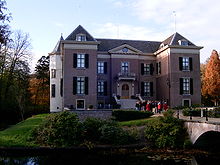
Picture - Huis Doorn in the Netherlands
In the early 1930s, Wilhelm apparently hoped that the successes of the German Nazi Party would stimulate interest in the revival of the monarchy. His second wife, Hermine (see below), actively petitioned the Nazi government on her husband's behalf, but the scorn which Adolf Hitler felt for the man who he believed contributed to Germany's greatest defeat, and his own desire for power, would prevent Wilhelm's restoration. Though he hosted Hermann Gx¶ring at Doorn on at least one occasion, Wilhelm grew to mistrust Hitler. He heard about the Night of the Long Knives of 30 June 1934 by wireless and said of it, "What would people have said if I had done such a thing?" and hearing of the murder of the wife of former Chancellor Schleicher, "We have ceased to live under the rule of law and everyone must be prepared for the possibility that the Nazis will push their way in and put them up against the wall!" Wilhelm was also appalled at the Kristallnacht of 9-10 November 1938 saying, "I have just made my views clear to Auwi [Wilhelm's fourth son] in the presence of his brothers. He had the nerve to say that he agreed with the Jewish pogroms and understood why they had come about. When I told him that any decent man would describe these actions as gangsterisms, he appeared totally indifferent. He is completely lost to our family ..."
In the wake of the German victory over Poland in September 1939, Wilhelm's adjutant, General von Dommes, wrote on his behalf to Hitler, stating that the House of Hohenzollern "remained loyal" and noted that nine Prussian Princes (one son and eight grandchildren) were stationed at the front, concluding "because of the special circumstances that require residence in a neutral foreign country, His Majesty must personally decline to make the aforementioned comment. The Emperor has therefore charged me with making a communication." Wilhelm stayed in regular contact with Hitler through General von Dommes, who represented the family in Germany. Wilhelm greatly admired the success which Hitler was able to achieve in the opening months of the Second World War, and personally sent a congratulatory telegram on the fall of Paris stating "Congratulations, you have won using my troops." Nevertheless, after the Nazi conquest of the Netherlands in 1940, the aging Wilhelm retired completely from public life. In May 1940 Wilhelm declined an offer from Churchill for asylum in the UK, preferring to die at Huis Doorn.
During his last year at Doorn, Wilhelm believed that Germany was the land of monarchy and therefore of Christ and that England was the land of Liberalism and therefore of Satan and the Anti-Christ. He argued that the English ruling classes were "Freemasons thoroughly infected by Juda". Wilhelm asserted that the "British people must be liberated from Antichrist Juda. We must drive Juda out of England just as he has been chased out of the Continent." He believed the Freemasons and Jews had caused the two world wars, aiming at a world Jewish empire with British and American gold, but that "Juda's plan has been smashed to pieces and they themselves swept out of the European Continent!" Continental Europe was now, Wilhelm wrote, "consolidating and closing itself off from British influences after the elimination of the British and the Jews!" The end result would be a "U.S. of Europe!" In a letter to his sister Princess Margaret in 1940, Wilhelm wrote: "The hand of God is creating a new world & working miracles ... We are becoming the U.S. of Europe under German leadership, a united European Continent." He added: "The Jews [are] being thrust out of their nefarious positions in all countries, whom they have driven to hostility for centuries." Also in 1940 came what would have been his mother's 100th birthday, of which he ironically wrote to a friend "Today the 100th birthday of my mother! No notice is taken of it at home! No 'Memorial Service' or... committee to remember her marvellous work for the...welfare of our German people... Nobody of the new generation knows anything about her."
The entry of the German army into Paris stirred painful, deep-seated emotions within him. In a letter to his daughter Victoria Louise, the Duchess of Brunswick, he wrote:
Thus is the pernicious entente cordial of Uncle Edward VII brought to nought.
Thus is the pernicious entente cordial of Uncle Edward VII brought to nought.
Concerning Hitler's persecutions of the Jews:
The Jewish persecutions of 1938 horrified the exile. "For the first time, I am ashamed to be a German."
The Jewish persecutions of 1938 horrified the exile. "For the first time, I am ashamed to be a German."
Death
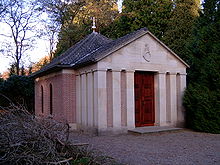
Picture - Wilhelm II's tomb in Doorn, Netherlands
Wilhelm II died of a pulmonary embolus in Doorn, Netherlands on 3 June 1941 aged 82, just weeks before the German invasion of the Soviet Union. German soldiers had been guarding his estate. Hitler, however, was reportedly angry that the former monarch had an honour guard of German troops and nearly fired the general who ordered them there when he found out. Despite his personal animosity toward Wilhelm, Hitler hoped to bring Wilhelm's body back to Berlin for a state funeral, as Wilhelm was a symbol of Germany and Germans during World War I. Hitler felt this would demonstrate to Germans the direct succession of the Third Reich from the old Kaiserreich. However, Wilhelm's wishes of never returning to Germany until the restoration of the monarchy were respected, and the Nazi occupation authorities granted a small military funeral with a few hundred people present, the mourners including August von Mackensen, along with a few other military advisors. Wilhelm's request that the swastika and other Nazi regalia not be displayed at the final rites was ignored, however, and they feature in the photos of the funeral that were taken by a Dutch photographer.
He was buried in a mausoleum in the grounds of Huis Doorn, which has since become a place of pilgrimage for German monarchists. To this day, small but enthusiastic numbers of them gather at Huis Doorn every year on the anniversary of his death to pay their homage to the last German Emperor.
First marriage and issue
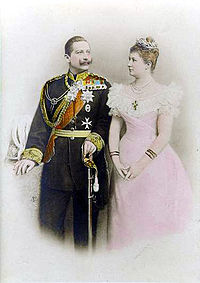
Picture - Wilhelm and his first wife Augusta Viktoria
Wilhelm and his first wife, Princess Augusta Viktoria of Schleswig-Holstein, were married on 27 February 1881. They had seven children:
Princess Augusta, known affectionately as "Dona", was a constant companion to Wilhelm; and her death on 11 April 1921 was a devastating blow. It also came less than a year after their son Joachim committed suicide-unable to accept his lot after the abdication of his father, the failure of his own marriage to Princess Marie-Auguste of Anhalt, and the severe depression felt after his service in the Great War.
Remarriage
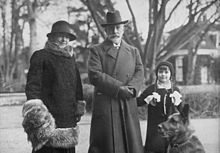
Picture - With second wife, Hermine, and her daughter, Princess Henriette.
The following January, Wilhelm received a birthday greeting from a son of the late Prince Johann George Ludwig Ferdinand August Wilhelm of Schx¶naich-Carolath. The 63-year-old Wilhelm invited the boy and his mother, Princess Hermine Reuss of Greiz, to Doorn. Wilhelm found Hermine very attractive, and greatly enjoyed her company. The couple were wed on 9 November 1922, despite the objections of Wilhelm's monarchist supporters and his children. Hermine's daughter, Princess Henriette, married the late Prince Joachim's son, Karl Franz Josef, in 1940, but divorced in 1946. Hermine remained a constant companion to the aging Emperor until his death.
Allegations
Philipp, Prince of Eulenburg-Hertefeld was implicated in circumstances which revealed homosexual activities (then illegal under German law) known as the Harden-Eulenburg Affair. When Crown Prince Wilhelm brought the news to his attention in 1907, the Emperor was shocked and pained. There was never any evidence that Wilhelm IIâs and Eulenburg's relationship went beyond friendship.
Titles and styles
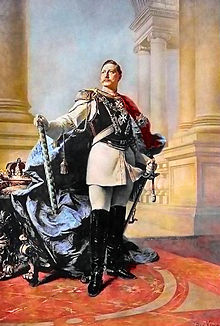
Picture - Wilhelm II by Max Koner 1890
27 January 1859 - 9 March 1888: His Royal Highness Prince Wilhelm of Prussia
9 March 1888 - 15 June 1888: His Imperial and Royal Highness The German Crown Prince, Crown Prince of Prussia
15 June 1888 - 18 November 1918: His Imperial and Royal Majesty The German Emperor, King of Prussia
Full title as German Emperor
His Imperial and Royal Majesty Wilhelm the Second, by the Grace of God, German Emperor and King of Prussia, Margrave of Brandenburg, Burgrave of Nuremberg, Count of Hohenzollern, Duke of Silesia and of the County of Glatz, Grand Duke of the Lower Rhine and of Posen, Duke of Saxony, of Angria, of Westphalia, of Pomerania and of Lunenburg, Duke of Schleswig, of Holstein and of Crossen, Duke of Magdeburg, of Bremen, of Guelderland and of Jx¼lich, Cleves and Berg, Duke of the Wends and the Kashubians, of Lauenburg and of Mecklenburg, Landgrave of Hesse and in Thuringia, Margrave of Upper and Lower Lusatia, Prince of Orange, of Rugen, of East Friesland, of Paderborn and of Pyrmont, Prince of Halberstadt, of Mx¼nster, of Minden, of Osnabrx¼ck, of Hildesheim, of Verden, of Kammin, of Fulda, of Nassau and of Moers, Princely Count of Henneberg, Count of the Mark, of Ravensberg, of Hohenstein, of Tecklenburg and of Lingen, Count of Mansfeld, of Sigmaringen and of Veringen, Lord of Frankfurt.
Documentaries
William II. - The last days of the German Monarchy. (Original Title: "Wilhelm II. - Die letzten Tage des Deutschen Kaiserreichs") Documentary film about the abdication and flight of the last German Kaiser. Germany/Belgium, 2007. Produced by seelmannfilm and German Television. Written and directed by Christoph Weinert.
Barry Foster plays Kaiser William II in several episodes of the 1974 BBC TV series Fall of Eagles.
Rupert Julian played Kaiser William II in the 1918 Hollywood propaganda film The Kaiser, the Beast of Berlin.
In popular culture
The Simpsons, Treehouse of Horror XIII - "The Fright to Creep and Scare Harms". The Kaiser rides in as a strange addition to an evil undead band of western villains, consisting of Billy the Kid, Jesse James, Frank James and Sundance Kid.
The Kaiser's Last Kiss, a novel by Alan Judd offers a fictional account of the Kaiser's final days at Doorn.
The Emperor Tamarin allegedly receives its name due to the similar mustache.
Sources
The focus of many biographies, of which the first (by Emil Ludwig) is still one of the most accessible.
Ludwig, Emil. Wilhelm Hohenzollern: The Last of the Kaisers, G.P. Putnam's Sons, New York, 1927 (translated by Ethel Colburn Mayne). (1970 edition, Ames Press). ISBN 0-404-04067-5.
Rx¶hl, John C. G.. The Kaiser and His Court: Wilhelm II and the Government of Germany, trans. Terence F. Cole, Cambridge: Cambridge University Press, 1994. ISBN 0-521-40223-9.
Kaiserlicher Yacht Club
Navy League (Germany)
List of people on the cover of Time Magazine: 1920s - 28 June 1926
Rulers of Germany family tree. He was related to every other monarch of Germany.
Wilhelminism
Alesund, a Norwegian city rebuilt by Wilhelm II after it had been almost completely destroyed by fire in 1904.
Further reading
Carter, Miranda. George, Nicholas and Wilhelm: Three Royal Cousins and the Road to World War I (2010)
Cecil, Lamar. Wilhelm II: Prince and Emperor, 1859-1900, Chapel Hill: University of North Carolina Press, 1989. ISBN 0807818283 online edition; Wilhelm II: Emperor and Exile, 1900-1941, (1996). ISBN 0807822833 online edition, the standard scholarly biography in English
Clark, Christopher M. Kaiser Wilhelm II. (2000) 271 pp. short biography by scholar
Clay, Catrine., King Kaiser Tsar: Three Royal Cousins Who Led the World to War. (2007). 432 pp. popular narrative
Eley, Geoff. "The View From The Throne: The Personal Rule of Kaiser Wilhelm II," Historical Journal, June 1985, Vol. 28 Issue 2, pp 469-485
Hull, Isabel V. The Entourage of Kaiser Wilhelm II, 1888-1918, Cambridge: Cambridge University Press, 1982. ISBN 9780521236652
Kohut, Thomas A. Wilhelm II and the Germans: A Study in Leadership, New York: Oxford University Press, 1991. ISBN 978-0195061727
Macdonogh, Giles. The Last Kaiser: William the Impetuous, London: Weidenfeld & Nicolson, 2001. ISBN 9781842124789
McLean, Roderick R. "Kaiser Wilhelm II and the British Royal Family: Anglo-German Dynastic Relations in Political Context, 1890-1914." History 2001 86(284): 478-502. Issn: 0018-2648
Mombauer, Annika, and Wilhelm Deist (eds), The Kaiser: New Research on Wilhelm II's Role in Imperial Germany, Cambridge: Cambridge University Press, 2003; 299pp; 12 essays by scholars ISBN 9780521824088
Mommsen, Wolfgang J. "Kaiser Wilhelm II and German Politics." Journal of Contemporary History 1990 25(2-3): 289-316. Issn: 0022-0094 in Jstor
Retallack, James. Germany in the Age of Kaiser Wilhelm II, Basingstoke: St. Martin's Press, 1996. ISBN 9780333592427
Rx¶hl, John C. G., and Nicholaus Sombart, eds. Kaiser Wilhelm II: New Interpretations â the Corfu Papers, Cambridge: Cambridge University Press, 1982 (reprinted 2005).
Rx¶hl, John C. G. Young Wilhelm: The Kaiser's Early Life, 1859-1888, (Cambridge University Press, 1998) 1016pp excerpt and text search
Rx¶hl, John C. G. The Kaiser's Personal Monarchy, 1888-1900, (Cambridge University Press, 2004); 1310pp excerpt and text search ISBN 9780521819206
Van der Kiste, John. Kaiser Wilhelm II: Germany's Last Emperor, Sutton Publishing, 1999. ISBN 9780750919418
Waite, Robert G. L. Kaiser and Fx¼hrer: A Comparative Study of Personality and Politics. (1998). 511 pp. Psychohistory that compares him with Adolf Hitler
More aircraft.
Source: WikiPedia